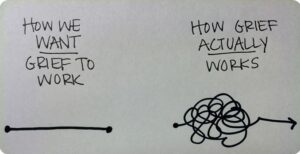Guest blog post by Stephanie Gutzmer, Au.D., E-RYT
Grieving is a process that is not over in 3 days, which is the typical length of employee bereavement time. So how do you deal with grief and loss in the workplace when you’re back to work and still grieving? Or you’re an employee wondering how to support a grieving employee? Keep reading to find out our best tips, but to best understand them, you need to know what grief looks like.
Understanding Grief
Grief is an umbrella term that encompasses the physical, emotional, and behavioral reactions of those who have experienced a loss or a traumatic event. It is a process that can continue for months to even years.
Grief can be hard to tie down into a single definition because it manifests into different emotions and actions for each individual experiencing loss. So to understand what grief really is means understanding the person who is grieving because it is such a personal process.
“Grief is the conflicting feelings caused by the end of or change in a familiar pattern of behavior.”
– Russel Friedman, The Grief Recovery Method
When you lose something or someone, it creates a hole in your routine – a loss. That loss is experienced every time you notice it missing in your day-to-day activities, like when you’re at the workplace. If the thing or person lost was a large part of your life, it may be felt too many times to count in one day. That experience of loss is grief.
Signs of Grief
When the waves of grief crash into you, your reaction will be equal to the size of those waves. Your response will be complex, taking on different forms and varying levels of intensity over time.
Physical
- Fatigue and lack of energy
- Hollow feelings or emptiness
- Tightness in your chest and throat
- Weakness
- Oversensitivity to noise
- Breathlessness
- Loss of appetite or over-eating
- Sleep disturbances
Emotional 
- Sadness
- Frustration, anger, or rage, possibly due to the inability to prevent or control the loss.
- Guilt
- Loneliness
- Helplessness
Psychological
- Numbness or shock immediately after the loss.
- Anxiety and fear
- Depression
- Confusion, disbelief, and/or denial
- Distracted or absent-minded
- Social withdrawal
All these reactions are a normal response to grief and should subside over time as you begin to accept the loss and learn to function in your new normal. For example, the initial numbness and shock is an evolutionary defense mechanism to protect you from pain. Instead of becoming overwhelmed by grief, your body attempts to gradually introduce the reality, which is why grief often comes in waves and changes over time. This numbness and shock subsides as the new reality sets in.
It may take some work to process some aspects of the grief. For example, anger may need to be identified and addressed to recover from grief and build anew. Or guilt may need to be looked at and put into perspective. It takes energy to do that work, which can make dealing with grief and loss in the workplace even more difficult.
Complicated Grief
Most people gradually get through the grieving process and heal. However, some get stuck in the process. When grief persists and doesn’t “digest,” it transforms i nto complicated grief. Complicated grief occurs in about 7% of bereaved individuals, where they become stuck ruminating over the loss, worry about its consequences, or excessively avoid reminders of the loss. They either are consumed by the loss or refuse to allow themselves to feel it. Unfortunately, by never working through grief, they are at the mercy of it.
nto complicated grief. Complicated grief occurs in about 7% of bereaved individuals, where they become stuck ruminating over the loss, worry about its consequences, or excessively avoid reminders of the loss. They either are consumed by the loss or refuse to allow themselves to feel it. Unfortunately, by never working through grief, they are at the mercy of it.
Those with complicated grief need support. If you are concerned that you or a loved one are having a hard time working through their grief, consider reaching out to a counselor. They have received training in grief resolution and can help you find your way through and past your loss.
Tips for Dealing with Grief and Loss in the Workplace
Grief is hard. It’s a process that has “stages,” but these stages come in waves and repeat. It’s normal to cycle back to a stage you thought you passed – even more than once. When you’re grieving, you may be nervous about allowing yourself to deal with it. You may not know how to start, when you’re finished, or even if you’ve done it “properly.” Again, counselors can be a huge help.
So if you’re employee, how can you best deal with grief and loss at your workplace? And if you’re an employer, how do you support an employee who’s struggling with grief? Here are two lists to help you out:
8 Tips for Dealing with Grief and Loss in the Workplace as an Employee
- Talk about the loss when you are ready. You don’t have to tell every co-worker all the details. Generality can be your friend. Instead, make time to talk with supportive family and friends, a spiritual leader, or a licensed counselor. Let the other person know they can help by just listening.
- While it may not always be appropriate to show emotions at work, the feelings will likely come. Instead of always avoiding the feelings of grief, find a “safe place” at work to allow the waves to come here and there. Because just like waves, they come and they will go. Approach it just like standing in the surf at the ocean when you lift your legs and just ride the wave, up and down. Allowing yourself to just ride the emotional wave, however intense and overwhelming it will be at times, helps you get through it. The intensity does lessen over time. The more you can make yourself available to experience these waves at home gives them less urgency at work.

- Related, consider setting aside time to allow yourself to grieve. Some people become swallowed by grief, whereas others bounce right back into their routine in an attempt to distract from the loss. Allowing yourself “grief time” can help you find a healthy balance between these two extremes. This time can be spent allowing yourself to feel the loss and exploring what you can do to work on healing. Some ways to work through your grief are journaling, doing art, talking to supportive friends or family, getting into nature, talking with a therapist, or meeting with a grief and loss support group.
- Try to follow a daily routine. In the beginning this may seem impossible. The sense of overwhelm can make it hard to move and think. Some may be afraid to do the daily routine because it reminds them of the depth of the loss. However, following a routine, even a pared-down one, gives you structure and helps stabilize you during a time that can feel incredibly unstable.
- Grief takes its toll emotionally, physically, and psychologically – this is all normal because you’re healing an emotional wound. To support yourself as best as possible, stay active and eat a healthy, balanced diet. Make sure you take lunch rather working through it. Bring healthy snacks so you can avoid the preservative and calorie laden items in the vending machine.
- Resist the urge to withdraw. While you won’t feel cheery, it’s important to allow yourself to be with others, especially those who may support you during this time. So push yourself to go to the water cooler and the lunch room.
- Avoid using food, alcohol, or other substances to manage your emotions or bury your grief. These only provide temporary relief and will never help you process and recover from your grief.
- Don’t make any big, life decisions. You have a hole in your life due to your loss. You may be tempted to fill it with something or deviate far away from your “typical” in an attempt to distract yourself. This is all it is, a distraction that, in the end, may cost more than you rationalized because it was done through impulse. This is generally not the time to leave your job or take that transfer.
Allow yourself to grieve – let the process come and work through it in whatever way makes sense to you. It may not be easy, but it’s necessary to heal this emotional wound. Many do not seek out support or help. If you are depressed by your grief, and are struggling to manage day-day activities, seek out a mental health provider. It is vital to develop a personalized support plan that works for you.
Related reading: How to Manage Grief and Loss: 4 Coping Strategies
5 Tips for Dealing With Grief and Loss in the Workplace as an Employer
- Recognize grief is a healing process, not a weakness. Every human being will encounter grief. A compassionate response to grief is essential to promoting the well-being not only of those grieving, but all employees. Have a bereavement policy that covers related benefits and support options.
- When offering condolences, keep it simple and don’t ask questions or push for details the employee might not be ready to
 share. But allow them to share if they need it. Consider offering grief training to educate employees on emotional intelligence and how to support another person while they are grieving.
share. But allow them to share if they need it. Consider offering grief training to educate employees on emotional intelligence and how to support another person while they are grieving. - Be supportive of those grieving, but let them go through the process. Yes, there are “stages” of grief; however, those grieving do not go through them linearly. When grieving a loss, it’s normal to feel many different emotions, and cycle back on some multiple times. Having reminders in your calendar is an excellent way to remember to check-in and offer support. The first year is typically the hardest, as all the milestones (e.g. holidays, birthdays, anniversaries, etc.) are experienced for the first time after a loss. But many bereaved persons report that the second year is also challenging as the “forever” reality of the loss sinks in. So checking in isn’t only relevant right after a loss, but for some time after that.
- While grieving, the employee may come back to work and struggle to be focused and as productive as before the loss. Consider making changes to the employee’s workload until he/she adjusts to being back. Do not punish your employee if you see a decline in their productivity. Dealing with grief and loss in the workplace is challenging. Offering support will help your employee more than adding to their current emotional burden. And it will get them back to true productivity more quickly than making them override the process.
- If organizational space allows, consider offering a safe “grief room” where employees can go to collect themselves if they are feeling overwhelmed or sad. If this isn’t an option, allow the grieving individual to take more breaks during the workday. Unfortunately, grief will hit the individual randomly throughout the day, as little reminders of the loss are realized.
Grief is a healing process that is experienced differently from person to person. Offering a range of support for grieving employees will improve loyalty, morale, and long range productivity.
Grief after a loss is normal. However, it can feel like a silent struggle. You may not know how to navigate life with this new loss, and others may not know how to support you during this time. Don’t do it alone; reach out for help. Life Care Wellness has many qualified therapists to assist you through your grief. Contact us if you are in near Glen Ellyn or Jefferson Park in the Chicago area.
Stephanie Gutzmer, Au.D., E-RYT
Stephanie is a certified yoga instructor and life coach. She also holds a doctorate in audiology, specializing in tinnitus. Her unique background and training allow her to help support others to promote health and well-being in their lives.






